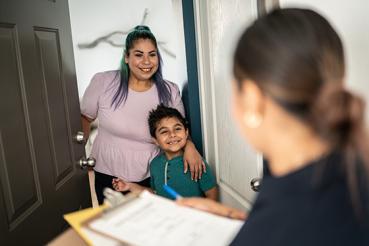Creating systems focused on youth, family, and community well-being
Children and youth experience better physical, emotional, and social health when they have access to safe, stable, and caring relationships, as well as supportive and nurturing environments. Conversely, exposure to child abuse and neglect decreases the chances that they will reach their full potential and truly thrive. Many children still experience abuse and neglect, resulting in involvement with the child welfare system.
Historically, child welfare systems have focused on serving children and youth (and their families) who have been, or are at risk of being, removed from their homes and placed into foster care. This is a worthwhile and important goal. Ideally, child welfare agencies can also work to actively prevent child abuse and neglect. To do so, they must partner with families, communities, public health, education, healthcare, and other systems to adopt cross-cutting, evidence-based approaches that help build the protective capacities of both families and communities.
AIR is committed to advancing this shift by promoting this public health approach and supporting evidence-supported strategies for children and families who are already systems-involved. AIR aspires to help young people, families, and communities flourish and achieve equitable outcomes.
Our Work
AIR brings years of experience in advancing public health prevention strategies and response-interventions through research, evaluation, and training and technical assistance. This interdisciplinary focus and collaborative approach allow us to wraparound child welfare systems to address the root-causes of child maltreatment and its impacts.
AIR’s interdisciplinary expertise includes the following:

- Behavioral health
- Child welfare
- Education and early childhood development
- Health care and related financing
- Juvenile justice and delinquency prevention
- Public health and prevention
- Substance use prevention and addictions treatment and recovery
- Trauma informed systems
- Violence prevention
- Youth and family engagement
- Participatory and co-design methodologies
AIR Child Welfare News
AIR CARES Director Amanda Latimore’s recently published paper, "A Public Health Approach to Preventing Intergenerational Transmission of Substance Use Disorder: Applying a Social Determinants of Health Framework to Child Welfare and Across Systems," explores how an increased focus on addressing parental social determinants of health can counter parental substance use and support the welfare of both parents and children.
Child Welfare expert Whitney Rostad won the 2024 Frank R. Bruel Memorial prize for the article, "The Effects of Child Poverty Reductions on Child Protective Services Involvement," which appears in the March 2023 issue of Social Services Review.




